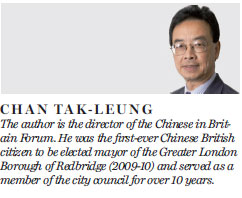Constitutional and reality checks for lawmakers of SAR
Updated: 2016-11-21 08:48
By Chan Tak-leung(HK Edition)
|
|||||||
Chan Tak-leung argues that Article 158 of the Basic Law serves a vital purpose - safeguarding duality of the 'One Country, Two Systems' principle
Although it was clearly stated in Article 104 of the Basic Law, the Hong Kong Special Administrative Region's mini-constitution, that all Legislative Council members must be sworn in, and I quote, "in accordance with law, swear to uphold the Basic Law of the HKSAR of the People's Republic of China (PRC) and swear allegiance to the HKSAR of the PRC", none of this was on display during the oath-taking ceremonies of some of the legislators-elect. They deliberately made changes to the oath which in effect invalidated their intentions to serve in the legislature.
Instead of pledging their willingness to serve as elected representatives of the electorates which voted for them, they deployed additional words, gestures and props which clearly indicated that what they uttered was dishonest, deceitful, insincere, inaccurate and incomplete, not to mention outright offensive. This was a display of total disrespect for the legislature and the Basic Law that governs its appointments.
Their acts were exactly the opposite of what's expected of them in the original oath, which requires them to uphold the Basic Law, bear allegiance and act conscientiously, dutifully, in accordance with the law, honestly and with integrity. Unfortunately, none of these honorable characteristics were forthcoming. With or without the requirements in the oath-taking process, it is obvious their actions that simply do not make them suitable to be legislators. What is more laughable is that a spokesperson for the US Department of State recently described the so-called oath-taking saga as "a silly form of activity" while in the same breath suggesting that "there should be political freedom as prescribed by the Basic Law".

Actions to ridicule the Basic Law must be censored and this has nothing to do with political freedom. It is about showing respect to the oath-taking process as stipulated in the Basic Law and the principle of "One Country, Two Systems".
If such behavior is apparently acceptable to US standards, if US President-elect Donald Trump alters the wording of his oath of office in January next year and displays a blanket with "New York is not the United States", will it be equally acceptable to the chief justice and in accordance with the US constitution? Most probably not. One therefore finds it totally illogical and a waste of space to read apparently ignorant and hypocritical utterances from the US Department of State.
While it was also patently clear that under the provision in Article 158 of the Basic Law, which states that "the power of interpretation of this Law shall be vested in the Standing Committee of the National People's Congress (NPCSC)", one is amazed to see that some members within Hong Kong's judiciary as well as commentators can make statements expressing their concerns when the NPCSC invoked its rightful power to interpret the Basic Law. Some of these legal operators went as far as to suggest that the interpretation would "deal a severe blow to the independence of the judiciary and the power of final adjudication of the Hong Kong court".
Article 158 is in the Basic Law to serve a very crucial role. It is there to uphold and safeguard the principle of duality of the "One Country, Two Systems" policy. One can go further and suggest that it serves the same purpose as the setting-up of police, courts and other regulatory bodies in the SAR. For while all citizens of Hong Kong have the freedom to enjoy all the rights contained in the Basic Law, this is only half of the equation. All Hong Kong citizens, at the same time, including its legislators-elect, are obliged to abide by the laws in force in the SAR.
"No one is above the law" should remain the maxim. It has served Hong Kong well in the past and is the guiding principle that must be protected at all costs for the present and future. Disqualified legislators-elect cannot deceive the public by stating that they were popularly elected or they are entitled to use insulting and derogatory terms because they believe in their nativist or "localist" causes. If they do not subscribe to the fact that China has sovereignty over Hong Kong, they can still act honorably like elected legislators in other legislatures. They can exercise their right to refuse to pledge their allegiance and abstain from the legislature like some Irish republicans did after their elections into the British Parliament all those years ago.
No one stops these legislators-elect from taking their seats except themselves. For the remaining legislators, one can only hope they will take heed of both the constitutional and reality checks brought about by the recent events. The rule of law must continue to apply in the legislature and throughout all aspects of activity in the SAR. Legislators are elected to serve the best interests of their electorates and, through a functioning legislature, they can ensure Hong Kong's citizens will enjoy better education, healthcare, housing and other social supports while the region will remain a global financial center as well as fulfill its role as the gateway to the Chinese mainland.
(HK Edition 11/21/2016 page1)